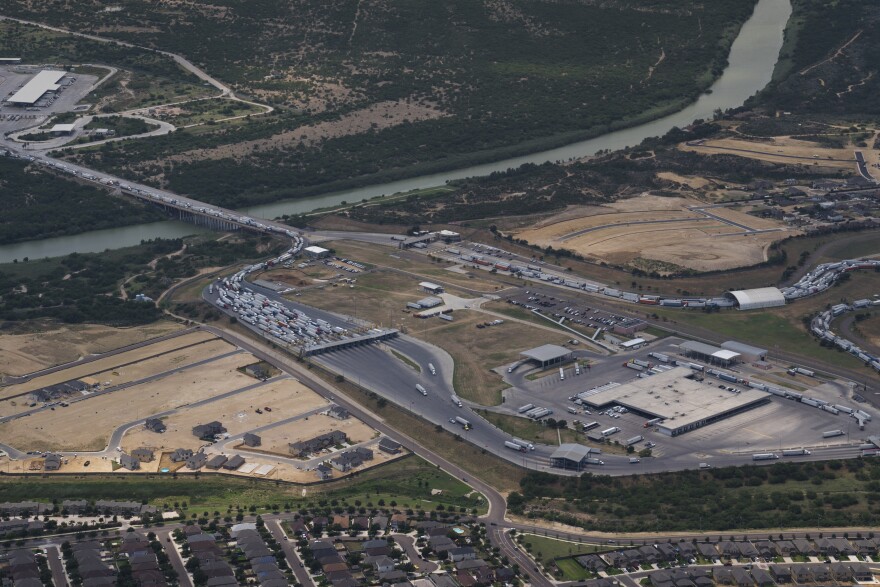Residents, business owners and political leaders in Laredo braced for President Trump’s threat of a 5% tariff on all goods coming from Mexico — that is, until Trump tweeted that Mexican officials “agreed to take strong measures to stem the tide of migration.”
The president initially said the tariff would begin June 10 and gradually increase to 25% if Mexico didn’t do more to stop the flow of illegal immigration into the U.S. Instead, Mexico was given 90 days to address immigration and curtail imposed tariffs.
Ernesto Gaytan Jr. is the general manager of Super Transport International in Laredo, a company founded by his father almost 30 years ago in Mexico.
“Laredo exists because of its location and the closeness we have with Mexico,” he said.
Gaytan, wearing a black fitted suit in 90-degree Texas heat, toured his company’s operations field.
“This is where a lot of the transloads happen,” said Gaytan. “We move materials from a trailer coming in from the United States into Mexico. We transfer freight from a U.S. carrier to a Mexico carrier, or from a Mexican carrier to a U.S carrier.”
Mexico recently surpassed China and Canada as America’s top trading partner, which helped catapult Laredo past Los Angeles to become the number one port in the country. About $20 billion worth of goods flowed through Laredo during the month of March — mostly automotive parts.

Gaytan said the tariff could impact his trucking company and jobs across the country.
“There are some companies that 5% is what their margin is going to be, so you’re talking about companies that are not going to be able to ship anymore,” Gaytan said. “It’s going to shrink the capacity. It’s going to shrink the market.”
Gaytan and other business owners are concerned there will be even longer lines at the ports of entry because many companies might try to double their average of shipments before the June 10 deadline.
Laredo has already been experiencing record wait times that can be hours long. This was recently exacerbated when the Trump administration reassigned 300 CBP officers from the ports of entry to help process asylum claims. Adding to the fear of the business community has been President Trump’s threats to close the border entirely.
“For us, I did the numbers and we would lose about $270,000 a day if the border shuts down,” Gaytan said.

At a town hall Friday, Gaytan and other local businesses brought their concerns to CBP. Eduardo A. Lozano, CEO of EELCO Supply Chain Solutions and a local broker, was in attendance.
Lozano said he’s begun receiving phone calls from importers who said they plan on sending double their shipments before the June 10 deadline.
“Is CBP prepared to receive all the additional influx of shipments?” Lozano asked. “Are we prepared?”
Brenda Smith, the executive assistant commissioner with the Office of Trade at CBP, took Lozano’s question.
“I would tell you not today, but tomorrow,” Smith said. “You have got to have your eyes open and your powder dry at all times because the situation changes so quickly.”
And that’s a problem, said Gerry Schwebel, executive vice president of IBC Bank headquartered in Laredo.
Schwebel worked on NAFTA and the U.S.-Mexico-Canada agreement. He said the tariff further strains the relationship between the U.S. and Mexico, especially when trying to pass the USMCA, also known as NAFTA 2.0.
“This is not in the spirit of open relationships with our largest trading partner, which is Mexico,” Schwebel said. “They will always be our neighbor. We can’t be in any way threatening or try to coerce our partners to do certain things.”
Schwebel said border communities like Laredo will be hard-hit if the tariff takes effect, but the consumer will ultimately pay the price.
David MacPherson, the chair of Trinity University’s Department of Economics, agreed.
“It’s a textbook example of how to do self-harm. When we put a tariff on Mexican goods or Chinese goods or anybody else, we pay the tariff. The consumer pays it. Not the other country,” MacPherson said. “Everything that we consume that’s manufactured in Mexico is going to get more expensive, and jobs are going to be lost.”

Laredo Mayor Pete Saenz said he is proud that his city of about 260,000 people is now the nation’s busiest trade hub, and he wants to keep it that way, but for that to continue, he wants to see the president separate the issues of trade and immigration.
“It creates uncertainty,” he said. “People wanting to invest, hold back. It jolts the system in a negative way.”
Reynaldo Leaños Jr. can be reached at Reynaldo@TPR.org and on Twitter at @ReynaldoLeanos
Texas Public Radio fellow Sierra Juarez contributed to this story.


